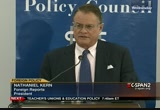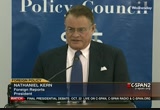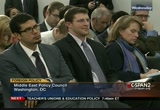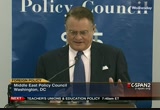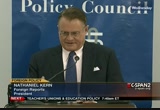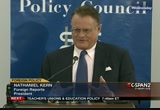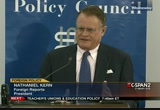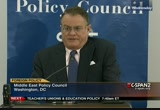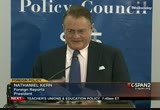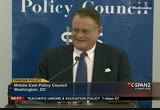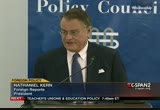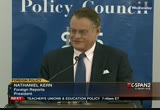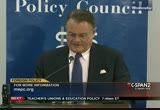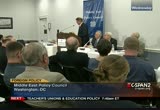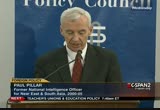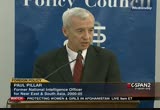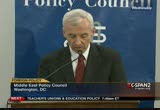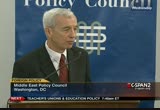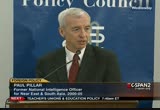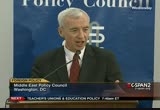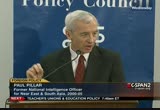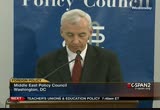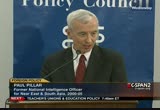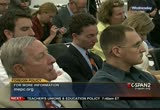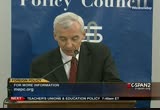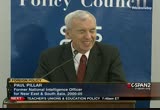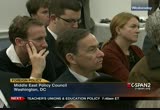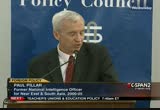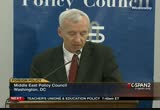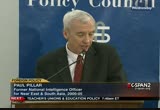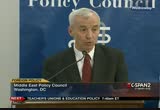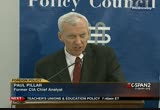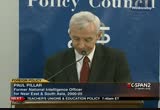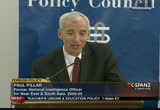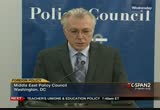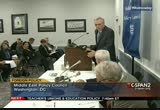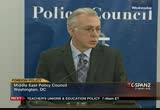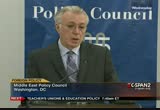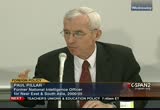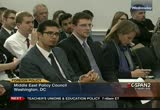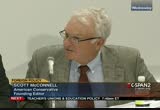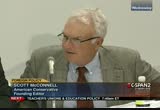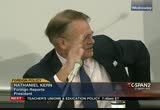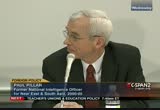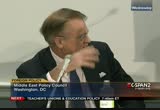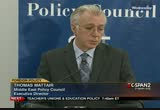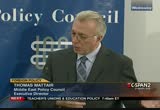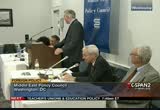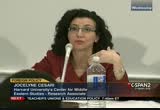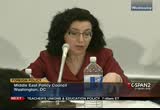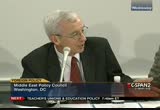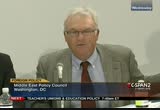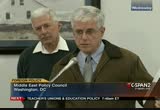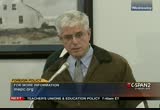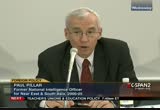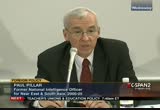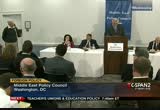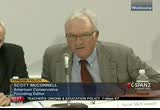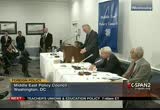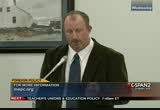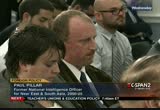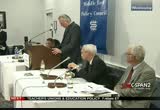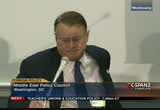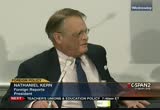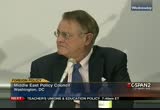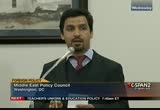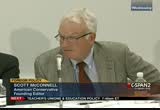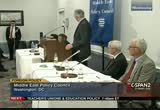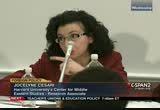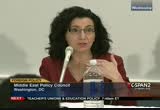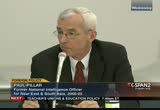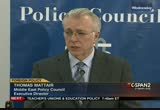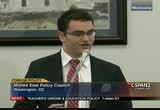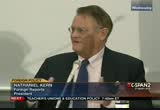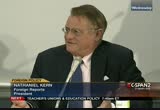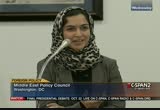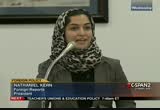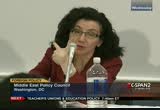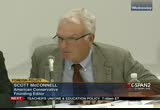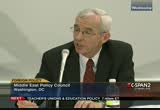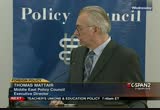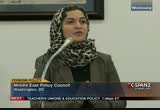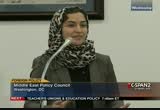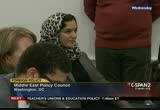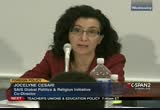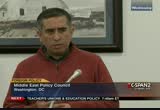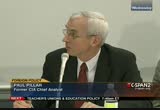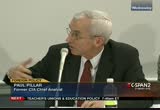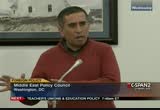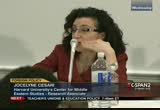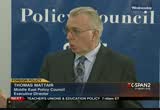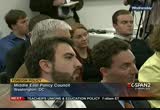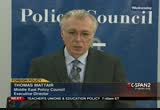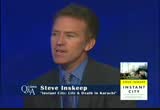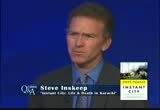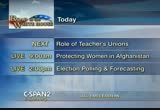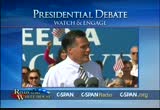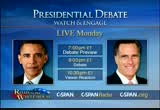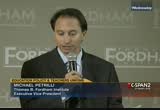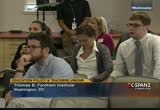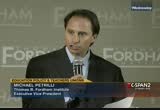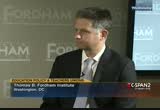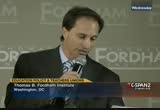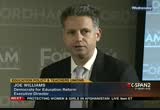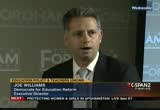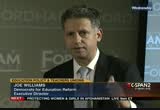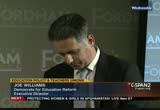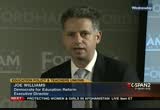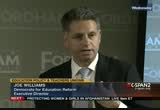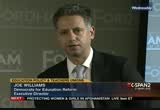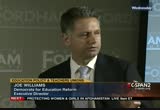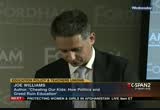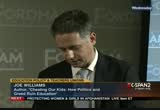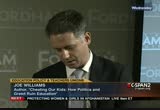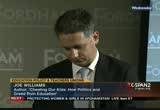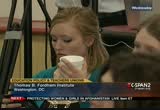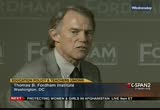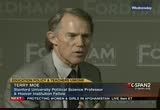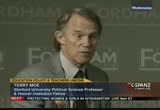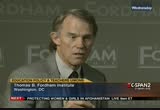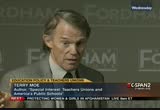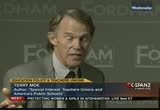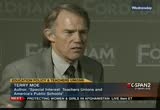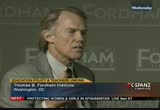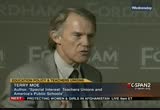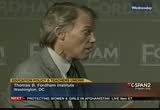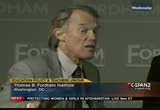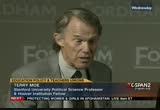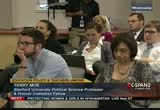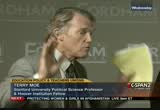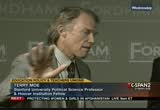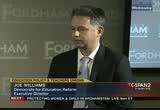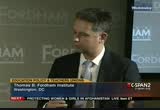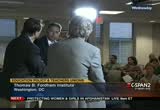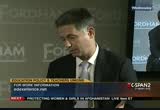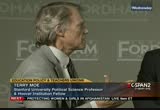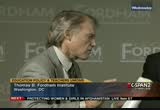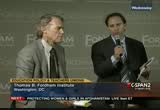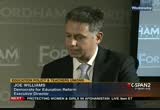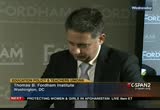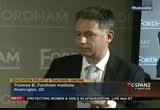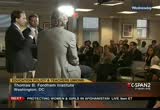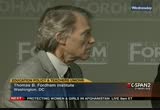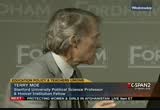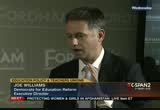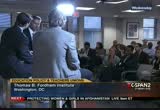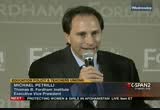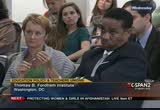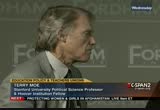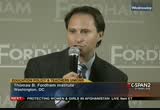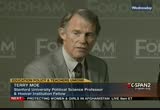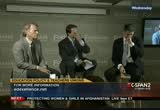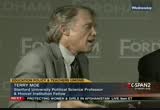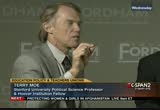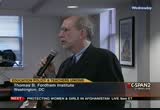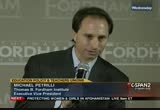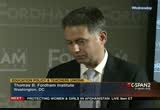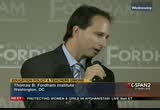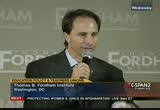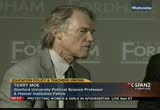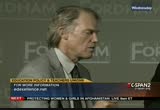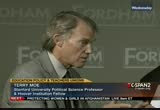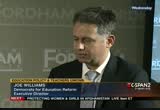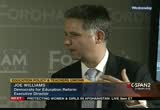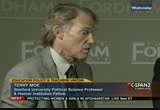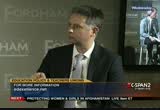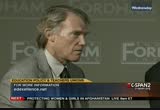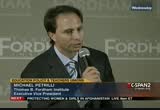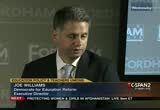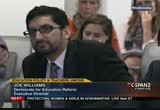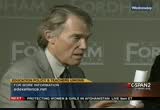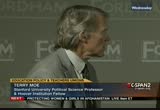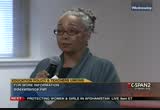tv Today in Washington CSPAN October 19, 2012 6:00am-9:00am EDT
6:59 am
7:00 am
won't be intervening any time soon directly, however, what i am curious about is if that's intervention does not happen, what would be the ideal scenario given the other actors in the region and how they are influencing that? >> the sad reality is this is one of those situations where there is no ideal scenario or even a good scenario. that is what i was alluding to when i opened my comments by saying there are situations where there is no good solution. i would commend, some of you may have read a piece by my friend and colleague in the washington post in which he makes the point that the world and especially the middle east is an awfully messy place, in many ways in which the united states can't be expected, no u.s. president could be expected to solve and resolve everything. the blood shed in syria makes
7:01 am
all of us shudder. that doesn't mean there is a u.s. policy option that will bring it to an end or even reduce it and most of the options i see in terms of trying to do more would exacerbate it. the full only other thing i can say as your question implies it is not just the u.s. but the other players in the region and with regard to the iranian issue as it -- as jocelyne said the same thing applied to syria. we should continue to work closely with our syrian allies, with the jordanians, jordan and iraq and syria, jordan iraq and turkey all have 100,000 refugees each in their countries at least. we can't do it all ourselves and our wish i could give you an ideal scenario but this isn't one. >> can i ask you? you were talking about it.
7:02 am
how did the saudis and others view the possibility of militant extremists coming to the fore in syria. having to fight militant extremists at home and do a good job of it, but what if the money and the arms are going to these people in a disproportionate way. and i was saying at the beginning of the david sanger article, you are going to militant extremists but if you read deeper into the article, it says the intelligence communities are having a difficult time determining who the rebel leaders are and to the rebel factions are. of we don't know who they are how the we know the majority will be militant extremists? if they are --
7:03 am
>> the problem is the militant extremists come to the 4 the more the rebel opposition in general feels abandoned by the west because of failure. because of the weapons they have been promised. that opens the space. so in a way it is one of those problems that has gotten worse with time if you are doing nothing or blocking effective weapons and that is why it is a conundrum if you are -- and ex-president takes office, what is going to happen between? overall you have a problem of unpalatable choices, the lesser of two evils.
7:04 am
in my book, to the extent that the soviet union had something to do with the defeat in afghanistan, the repercussions we had from weapons going to afghanistan was better, but better that the u.s. and soviet union are not still threatening to demolish the earth compared to the other fallouts. we have had tough decisions like this in the past. the second major recipient of u.s. arms during world war ii was stalin's soviet union. it might not have won without that. bad consequences. those are the choices. eyes wide open, please.
7:05 am
>> a member of parliament >> during the uprising. my question is for mr. stockton. the bad situation in the gulf, i am looking to hear about the challenges, in fact, looking to the gulf, the safest bet for stability and the interests of the americans and citizens in the gulf, and encouraged by them. what is feasible for the next administration to play a proactive role, in the past.
7:06 am
7:07 am
history and experience. i think we can be an example and encourage students to come here and study. i don't see the american policies dealing with sectarian issues, and it is beyond us. >> there is a related question from someone watching the live streaming which is should the next administration put more emphasis on human rights violations by the islamic republic of iran in order to promote -- expose and promote their crisis of legitimacy?
7:08 am
>> i completely agree that a values like human rights doesn't work and we did that already and it would be very bad for the u.s. to teach something to the country's but there is again -- you need another approach that is working. we the people in the region. there is no tailored situation. you have to look at the protagonist at stake. you cannot just say i am going to solve the question of human rights because they don't always reflect the relationship of power on the ground. if the u.s. cannot get that and they agree we cannot do domestic cleaning or correction but we
7:09 am
can have a geopolitical region and posing your question about the dynamic that comes into question have iran before that too. this is something we can do but it doesn't mean u.s. and all the questions to get out of the mentality to do something to do. there is much more thought to put in the rule of generally grounded or something that doesn't mean anything that you gave an example what can happen and it did happen for the u.s. in some part of the world and others too. i think it is time the u.s. cannot solve everything. does it mean that the u.s. has a diminished role? i don't think so. it is another approach on what is the leadership.
7:10 am
i am not buying the decline of the u.s.. there are a lot of things going on. cannot be the sole actor and a complicated issue and we have not paid attention enough to the regional actors. one of the mistakes in afghanistan is not only to take into account the whole regional balance of the afghan conflict because we had the cold war framework. it is something we have to learn. >> i would comment that trade offs abound, u.s. interests are multiple. we have a limited number of diplomatic and political chips to use, and the more you concentrate on one objective the less you have on another objective. if we are all tied up in knots about the nuclear issue in iran
7:11 am
and we want to get something done on that, there is a human rights issue which is a genuine issue on which we ought to make our preferences and principals clear, nonetheless to try to do something about that may not only run into the inherent limitations jocelyne has mentioned but may work against our attempt to advance other interests or achieve other objectives. >> what the u.s. has done in bahrain is encourage talks in the government and the opposition. from the u. s. point of view it is a non nato ally, over the past ten years it looked like they introduce more reform than a lot of other countries in the neighborhood. if we lack the capacity to do
7:12 am
more at least we have asked for a negotiation and both parties have to be realistic about these negotiations. yes? >> my name is joshua jacobs. i am an analyst at the jamestown foundation and my question is for mr. kern. it seems to me that when you talk about the gulf and the problem and challenges the next administration has to deal with, one of the biggest questions is what kind of leadership will the next administration deal with? with a 91-year-old prince who is 86, it seems certain who is president next will face new leadership in saudi arabia. my question for you is who do you think that might be? they you think it will someone with a significant impact on the relationship with saudi arabia and the region at large? there has been some -- there has been a quitter insider you're
7:13 am
probably familiar with who has been releasing a lot of ostensibly inside information from the inner circle, the royal family confirming a lot of rumors people had heard about certain members's health and ambition. nice to know what your thoughts were on this. >> thank you. you have tacked a few years on to the king's age. >> and the crown prince -- [talking over each other] >> we are in a better place now than we were two years ago when we had an incompetent crown prince in intensive care. he was going to be the next king. that was not so good. opinions vary about the late
7:14 am
prince, by comparison, soman is more worldly and more open. nevertheless, there is a pressing need, and i don't believe i would be telling anything new to the saudi leadership in this, to move to the next generation. we have terribly capable people in their 50s, and i think particularly of the guy who has been running the counterterrorism thing, capable and good politician, very well-rounded person, very sensible, i would love to see him elevated to a position of greater responsibility. as a policy matter you got to wait until that happens. there is nothing we can do.
7:15 am
if there are some changes the next president, the next secretary of state has to be apprised of what they are. there is not a particular policy choice we can make about how the family regulates its affairs and succession. >> i am a physician from bahrain. i want to ask a question about the credibility of the u.s. values. i know the complexity of the geopolitics of the region. i understand the concerns about iran and how does this have an impact on the policy, but as experts and intellectuals what
7:16 am
would be your advice for the administration for the long term interests of the u.s.? don't you think that what happened the last couple years, the arabs spring and what has happened in bahrain and saudi arabia, does it raise a question about the stability of the government and how these are going to survive in the long term and how people in this region receive the united states if the united states -- on the side of their possibilities. i come from bahrain and i know that they look up to the united states as a model they are seeking. they are looking for support. they think the united states has obligation to them because of the navy prisons.
7:17 am
the frustration is growing and the disappointment is growing. we have a majority that are not presented. a majority that is the oppressed and ruled by a minority. that reflects not only the shia in bahrain but eastern saudi arabia and kuwait and the whole gulf region and this image of the united states is not only in arraigned but the region. don't you think it is not only a moral obligation to stand with calls for democracy and rights but also in the interest of the united states, i would like to know what would be your advice of how to react to people's demands. >> i would like to respond to that because it is that very important question that shows
7:18 am
exactly the vision from the society we are not paying attention to. all the changes that happened in the last two years were not made by the actors we are discussing. society did it. we are not paying enough attention. can come from the changes in the balance of power. we think of saudi arabia in connection with other countries. as long as we are not ready to change and include society in the vision of this part of the world we are going to need the opportunity to have elements of talking differently to people and it is interesting to see the whole angle remains on how to
7:19 am
deal with this liter or this meter and if we had one lesson learned, the changes don't come from professional politicians. they come from globalization. they will come from movement within society. i don't have any model of that but completely different outlook on how we interact with their region. >> i agree with that. i don't want to say too much more. i don't think the united states -- it is american interest to not get too involved but clearly we are involved and i think it is pretty obvious that in two
7:20 am
generations the gulf regimes -- probably we can agree that they're not the eternal. one generation, ten years. >> i disagree on the last point. jack goldstone at george mason has a thesis that he calls the sultan district regimes. even if they are monarchs, they don't have historical legitimacy that royal families have in the gulf and jordan and morocco. those secular dictatorships that don't call themselves monarchies are more fragile where the monarchies have a more potential, here i think with muhammed vi in morocco, has more potential of making the sorts of concessions and ceding partial political power to popular forces while still being on the
7:21 am
throne. the biggest, most recent change mohammed in morocco made was to cede an awful lot of power to government representing an elected assembly but he is still sitting more or less happily in his seat as the king. >> united states has strategic interests, ideological interests, extremely difficult to pursue them both at the same time. the ideological interest long-term we favor more popular participation but how much strategic interests can you jeopardize in the short-term? that is the dilemma for american government. >> we have to make a distinction between making principles clear versus messing up. i am a strong believer in the hippocras the principle of do no
7:22 am
harm. despite noble objectives in a lot of places we wound up doing harm but that doesn't mean we have to retreat from making clear what principles we believe in and over all the arabs spring and arab awakening in my view is a good thing from the standpoint of american interests and american principles. >> brief comments. jocelyne, you might be interested in this. i met a saudi woman, pretty prominent, she said i hope we don't get one man one vote here because if we get 1-man 1-vote i am going to lose all the gains that women have made under this king. is king reforms gradually while he has a population that is more
7:23 am
conservative than he is. he walks a tightrope in a way. lawyers are told never to ask questions if they don't already know the answer but let me ask you a question. in the negotiation between the government and the position, is it true that the opposition asked for the legislature to have the power to name a cabinet? is that a reasonable -- is that a reasonable negotiating point? here the legislature in the united states does not name the cabinet. the cabinet is named by the executive branch. >> this is a detail -- i will answer. this is the detailed.
7:24 am
what is happening now in bahrain, no incentive to engage with the opposition and no pressure on our regime to engage in a genuine dialogue with the opposition. opposition declared very clearly they are ready for dialogue and ready to set and discuss all these issues, they don't want a democracy to happen overnight. they are ready to discuss steps how to get there. there is no incentive and to be in the place of this regime why would they do so. they have oversupport from their allies. they don't have any pressure. people are unarmed even though they are a majority. regime defenders, political leaders, physicians,
7:25 am
journalists, lawyers, intimidated because they spoke out and said we need more rights. we have a prime minister on his feet for 43 years that has been no other prime minister since the state was established in bahrain. is this something to be proud of? we are not asking for a full-blown democracy tomorrow. we are just asking for a fairer presentation for an elected government and even this can be negotiable. this is not happening and the repressive -- the repressive measures, security is going on and people getting killed and locked up day after day. this is what is happening. >> can i say something?
7:26 am
i think what you are pointing at is exactly what may not be the top -- about the relationship u.s. can have not only with the state and state actors and different elements of civil society. how does it work? and not telling people what they have to do but to put some kind of challenge of accountability on these countries and what do they do? how do they walk? the point is not that the u.s. will say this is the right into locator -- interlocutor, but ended up being this kind of selection. we bring everybody to the table. i think we see something we have never tried.
7:27 am
the exception was the sudan case from 2004-2008. >> i want to make sure -- you have a question? [inaudible] >> we have five minutes and i want to get that question. >> saying the united saves the doesn't want to engage, it is perceived by people as not doing anything. it is perceived as doing a favor or being on the side of the regime. choosing not to do anything or to be very neutral is actually doing positively support the regime. this is the perception of the people. >> excuse my english. digest came here. i just have one question.
7:28 am
has there been any successful sanctions in history? has there been any change in regime? wide to the united states usually focus on sanctions? i am from iraq, and 13 years of sanctions and i think they empowered the regime -- we couldn't fight the regime because we were trying to survive and that happened in the 1980s and you are doing it again. is there any reason for that? >> first of all one has to be clear what the purpose of sanctions are. squeezing the regime to try to topple it is one possible purpose. inducing the regime to make concessions or change policy is an entirely different purpose. part of the problem with the iranian sanctions is we have
7:29 am
people who believe each of those things are objectives and they work against each other. if you thought these sanctions were going to squeeze the regime to the point that it would fall that would mean be absolutely inflexible. don't concede anything where if you are going to use them as they extensively are as leverage to get change in the iranian policy and the nuclear battle that argues for something different. argues for flexibility. i am aware of no instance where sanctions could be credited with toppling a regime. if you are going to use them to get policy change, then a clear successful example is libya under gaddafi. they were not that way and we should remember the change gaddafi made, drastic change in policy where he gave up his unconventional weapons program and his terrorists programs associations, and that was after he gave up the pan am 103
7:30 am
suspects and the lifting of sanctions was a big part of that. he was under united nations sanctions for several years. they were broad sanctions. they stopped short of an oil embargo so he did not have sanctions on the part of the countries they were voting in. that was a successful example and it worked because it was coupled with the offer and the negotiation have a new relationship, to lift the sanctions. ..
7:31 am
does that make them friends to the united states? is that going to make the iranians friends to the united states? >> i think you appropriate make the point there's a further downside with regard to just help populations will react to this. perhaps joslyn or someone else would want to comment more specifically. but that is a hazard that has to be taken into account. >> just on the iranian case, you're right. the regime as it is now may not be strong in areas, but the functions are used by the current president as a way for cooperation and cohesion among all iranian scum even the opponents to face the outsider or the threat from outside. so instead of weakening regime,
7:32 am
what we are witnessing is sort of persistence of the regime because people are not processed or undermine his power at this moment, what they see, they see iran as a community under attack. and so it's helping him. he uses, we know that, and i could elaborate more. the function as a tool for controlling domestically the country. >> if you're not sure what diplomatic deal you want, if you're not sure you can sell the diplomatic deal to the public. and you think the cost of war are too high. sanctions is a way of showing people that you are doing something while you wait, figure out what you want out of diplomacy, our way to find out if you can avoid a war.
7:33 am
because war, interesting that you're from iraq, because there's a report coming up from the world health organization very soon that's going to document how many miscarriages there have been in falluja and how many birth defects they're been in falluja since 2004. we don't even talk about their very much when we think about war with iran. a lot of people will die. >> am i right that -- [inaudible] >> no. [inaudible] >> am i right that their foundations are supporting all the sunni terrorist groups in the world? >> well, actually yet, the
7:34 am
bahraini ruling family asks for support from other members of the gulf cooperation council. the saudis sent members of the national guard, or which unit was at? >> national guard. >> national guard. basin police and i think -- they went to protect major infrastructure in bahrain. so that bahraini secured forces could deal with the demonstrations. but from their point of view, and this is the dilemma from the united states, too. you know, iran has exploded situations before. and has to exploit its situations. there's a fear that it could exploit this one again. and that is why when we look at
7:35 am
them, we do not know what to make of this group and where it stands on questions of democracy participation, and where it stands in its relationships with iran. we have concerns about them. at our decision-making. is there any other question? it's 12:00. we really need to close because of the camera. so i guess i will say at this point thank you very much for coming. thank you to the panelists. [applause] >> and again we have a website, www.mepc.org. i hope you visit it. >> there's a movie theater that i write about. i had gone to visit it. it's been there since 1947 which is the founding of the country. it had shown films from all over the world from the united states, from england, from hollywood and india.
7:36 am
and to me it symbolized the resilience of the country and the openness of the country in spite of all the violence and trouble the people have suffered over the last many decades in pakistan. during one of the protests against a video that insulted the prophet mohammed, had a very negative image of the problem public comment or were those protest people turned against the movie theaters and burned them. spent i don't really see that as a protest against the west. even though avatar, one of the movies you could of gone to see at the theater. you had islamists activists who would not like these movie theaters for decades come way before this prophet muhammad in which is never shown in the anyway. and say they grabbed an opportunity to attack and they whipped up a bunch of young
7:37 am
people. they were teenagers involved who stole sodas and snack bar on the way to burn this movie theater, just tortured. and i argued in that piece that what they were really attacking was the nature of their own country which perhaps they did not understand. i try to say that with the greatest respect. who am i as a foreigner to say what your country is about? but, you know, from having studied the history, from having listened to pakistanis themselves that it's an incredibly diverse place. it was born as an even more diverse place than it is today. lots of different cultures, lots of different traditions, lots of different ways to be. that movie symbolize pakistan and that is what people burned when they set on fire. >> more more with "instant city" offer steve inskeep sunday at 8 p.m. on c-span's q&a. >> see the presidential debate monday night live on c-span, c-span radio and online at
7:38 am
c-span.org. watch and engage. in a few moments a look of the role teachers unions play in education policy. we'll be live at 9 a.m. for a wilson center form on protecting women and girls in afghanistan. the national academy of sciences hosts a discussion on the process of election polling and forecasting. that's live at 2 p.m. eastern. >> a couple live campaign events to tell you about today on our companion network c-span. vice president joe biden will be in sun city florida just after 11:45 a.m. eastern. then at 4:45 p.m. new jersey governor chris christie campaigns for mitt romney and richmond, virginia. >> i have to be honest with you, i love these debates. these things are great. and i think it's interesting that the president still doesn't have an agenda for a second
7:39 am
term. don't you think that it's time for him to finally put together a vision of what he would do in the next four years if he were elected? it's got to come up with that over this weekend because there's only one debate left on monday. >> so let's recap what we learned last night. his tax plan doesn't add up. his jobs plan doesn't create jobs. his deficit reduction plan adds to the deficit. so, iowa, everybody here u.s. heard of the new deal, you've heard of the fair deal, you've heard of the square deal. mitt romney is trying to sell you a sketchy deal. >> we are not buying it. >> watch and engage money at president obama and mitt romney meet in the final debate moderated by cbs bob schieffer from lynn university in boca raton, florida.
7:40 am
>> now a forum on education policy and teachers unions. speakers included joe williams with democrats for education reform, and terry moe with the hoover institution. this is a little as than an hour and a half. >> good afternoon, everybody. i'm michael petrilli of the thomas b. fordham institute. if you're joining us for the first time, either live or at home, we are one of the nation's cream education policy think tanks. we also do work on the ground in the great state of ohio will we are an education reform advocacy organization in columbus and also charter. right now 11 charter schools out of our dayton office. we are gathered here today to talk about the future of teachers unions. but that's a little bit of a misnomer. because what we're going to talk about today, at least spent a
7:41 am
lot of our time focusing on is the education reform community. on that score there's some very sharp differences of opinion. within the reform prep. on one hand there are conservative reformers, mostly republicans, who applauded the efforts of wisconsin scott walker and ohio's john kasich to limit the scope of collective bargaining to outlaw teacher strikes him and to eliminate agencies. these are the fees paid to the unions by non-members. in this perspective unions are all powerful behemoths that need to be reined in, and particularly at the local level where they can easily elect school board members friendly to their positions. they can b be in the position of arguing with themselves. the argument. so with this line of thinking, states need to act to container power, lest they block reform, drive up costs and otherwise do what teachers groups tend to do.
7:42 am
on the other side are the progressive reformers, mostly democrats, who bemoan to the tactics of walker and casey can argue for more conciliatory approach. the arne duncan, for example, actor and a big debate in wisconsin, he argued walker's position was quote nonsensical because the unions had already conceded on the key kitchen table issues. they already said will take lower pay, lower benefits. to be sure, these progressives are not afraid to scrimmage with the unions, or to raise money to defeat them politically, but they see collective bargaining and striking rights as sacrosanct. and this issue is far from settled. california in a few weeks as an initiative on the ballot that would make the golden state are right to work state, meaning it would eliminate these agencies fees paid by non-members. michigan has an amendment on about the we try collective bargaining rights in the state constitution.
7:43 am
these debates are alive and well. what we're going to forget today's to to get which part of the reform coalition is right on this issue. should reformers work at the state level to curtail collective bargaining rights, to make teacher strikes illegal, to turn every state into the right to work state for these agencies that are not allowed? so to debate these issues with to opinion makers in the community. we are doing this town hall style by the way just like last night with a presidential debate. hopefully, i don't want is you guys standing up and coming to blows. i think many of us thought that perhaps the president and the governor going to start punching each other. i don't want to see that kind of behavior. so first up we have joe williams was the executive director of democrats for education reform, formerly a journalist at the "new york daily news" and "milwaukee journal sentinel." he's written a ton on education and wrote a great book several years ago, cheating our kids,
7:44 am
how politics and greed ruined education. good title. >> thank you. >> then we have terry moe. terry moe is a senior fellow at the hoover institution and also a political scientist at stanford university. he's written of the imminent book on unions. of course, terry has a very distinguished career including writing another seminal book, which is -- where is it? [inaudible] >> on one of the first books i ever read on education reform. you don't want to know how old i was. he also we should point out receive thomas b. fordham foundation prize for excellence in education, which we're very glad to give you a few years ago. so to get started, those of you are watching online we want you to join the conversation. when it comes time for questions
7:45 am
you can send us questions at questions at and excellence.net. on twitter both online and those of you icy tweeting life. i know you're not checking your e-mail on your iphones the tweeting, good. you want to use hash tag afterchi. we will start the conversation. so this is going to be a debate so we'll start by giving each of our speakers 10 minutes to make their case and so we will start with joe to make the case on behalf of of progressives about why we shouldn't go after some of these fundamental collective bargaining agency fees, striking rights and the like. joe, take it away. >> sure. i think for the first portion of the 10 minutes that mike has given me to make my case, i want to try to offer a little bit of context where i think this
7:46 am
discussion is likely to go after we do our 10 minutes. and it's sort of not even half-baked, maybe a quarter big theory that i'm still playing out. made of discarded after this. but it's something i'm sort of playing with, sort of looking the facts am looking back at the last 10, 15, 20 years of education reform. being a series of overreaches and then we calibration, and i can look back and make a pretty good case about who was doing overreaching and what the recalibration looked like. but i'm going to come back to this overreached theory and recalibration, and think back two years ago around the country about what was happening politically with education reform. and i think i'm going to try to make a political argument today, and then i'm not merely one about what is collectively
7:47 am
bargained, or what kind of role teachers unions are playing or not playing in change happening on the ground, or not happening on the ground, in districts around the country. but one that looks at where the possession arrow was pointed, like a basketball situation. we were in what i would consider a dramatic period of recalibration two years ago. we were looking at, and it was recalibration driven by three primary concerns or driving factors. one was fiscal reality. it was abundantly clear to many political leaders, and bean counters in government, that doing things the way we have been doing things, within public education, it was going to work in a fiscal sense. we had a lot of long-term obligations, which were coming to, which we were falling behind
7:48 am
on it and essentially that's a sustainability of public education if we would not make any changes, what's going to be very difficult to the federal stimulus package, which included a significant amount of money that went to districts to keep teachers employed back in 2009, 2010. sort of prolonged some of the pain and some of the edges of these discussions, but it didn't erase them completely. we were dealing with output-based reality that we have more data than we've ever had before about what was working and what wasn't working in schools. and there were a lot of politicians around the country who, most notably democrats, who were frustrated that they were offering solutions, often partnering with teacher unions that didn't seem to match the severity of the problems that were becoming apparent to just about everyone in the post no child left behind world.
7:49 am
i'll get back to that point. the third, the third issue that was driving this, sort of like a broad-based solidarity on part of organized labor in general. not just teachers unions. frustrations that teacher unions were not there to fight side-by-side with other labor unions around the country, frustrations from other public sector unions in particular that while they have been making concessions in the last 10 years, teacher unions generally were asking for more and more at the table. and there was, we can debate about the size of the split but there was a lot of anxiety within the labor movement in general about where teacher unions were positioned. so with some prodding from race to the top in some other factors we started using a lot of different conversations that were playing out in state houses and governor mansions around the country.
7:50 am
both in states that were controlled by democrats and states that were controlled by republicans. and it was generally about what other going to do about this? what are we going to do about the fiscal realities that we are confronted with? what are they going to do with the educational realities that we're confronted with? and at times that you would dovetail together. if you start to imagine what a bailout was going to look like eventually are underfunded pension systems or even just general operating budget for school systems around the country, there were a lot of politicians were saying we cannot go to taxpayers and ask them to dig down even deeper to solve some very big problems that are looming on the horizon, in less we are very -- and less were able to make a very convincing case that were doing something in public education. in many other states, particularly states whether democratic leaders incentives and assemblies, and democratic governors, teacher unions were involved in these conversations.
7:51 am
and they were stepping up to the plate, i would argue, with more than just what mike mentioned about in wisconsin where they were offering wage concessions and benefit concessions. offering to go down some path that they had not been willing to go down in the past. issues like teacher evaluations that some component tied to student performance. issues like greater public school choice. even some issues which had been sort of the holy grail about tenure and what it means to earn tenure in places. so this is sort of the backdrop that was playing out in many states around the country two years ago at a time when the wisconsin legislature went overwhelmingly to the republicans in the election, and governor scott walker was elected. at a time when governor walker took office and the republicans
7:52 am
controlled both the house and the senate in wisconsin, it was common knowledge, everybody understood that elections matter, and what you saw from the wisconsin education association council were what appeared to be, like on the outside, initial overtures to start going down some of these paths about dealing with teacher evaluations, dealing with performance pay, and a few weeks prior to the legislation that was introduced by governor walker, yet we saw the state union in wisconsin through the largest city in the state under the bus. they supported discussions about breaking up the milwaukee public school district into smaller unions which is something that had been on the table for the last 25, 30 years in wisconsin. and was generally posed by teacher unions there at the time. aside from what the union was offering, politically was going out in wisconsin at the time, you saw a larger number than
7:53 am
ever before, collection of democratic state legislators, particularly in the milwaukee area who were actively engaged in score from discussions which have been off the table for democrats for a long time. this included expansion of milwaukee's private school choice program. sorry about that. >> water all around. >> a growing democratic support for expanding charter schools in wisconsin, and making efforts to attract some of the nation's high-performing charticle networks, and some of the other teacher tenure and some of those issues. to be fair, in the aftermath of all the drama that played out in wisconsin, some of these issues did go through. there was an extension of the voucher program, particularly
7:54 am
because governor locke was pushing it so hard, with some democratic support. there's a slow, very slow-moving teacher evaluation plan in wisconsin that's attached to the states waiver application from the federal government from no child left behind. but what we saw when governor walker introduced his package of legislation, the way it looked to me was is nothing but an attack on a political opponent of teacher unions, was a dramatic retreat on a lot of these issues. it began a war that got casualties that we are still begin to see. and it began a massive recalibration of sort of the education reform dialogue and discussion. winner before the discussion was about what are we going to do to save public education, governor walker shifted the discussion to what are we going to do to save labor unions? took a very different
7:55 am
existential discussion the place out. the overreach which i would argue in this case, governor walker's overreach, very much shifted the momentum. and we are still seeing that today, the strike in chicago i would argue had very little to do with actually what was being bargained collectively. the strike vote took place in the fourth the union got back his factfinders report, and it just sort of listened to the comments and the frustration of teachers who were picketing in chicago. it wasn't just about the contract but it was sort about education reform, movement in general. part of the recalibration of an overreach. so i'm not sure whether the chicago strike is going to be the end of act i. we are going to start looking to an act to where the biggest question is going to be get a chicago teachers union overreach in that case, or did mayor
7:56 am
emanuel overreached? i think is still remains to be seen but i think anyone who is watching closely saw that in addition to the larger issues of education reform and standing up to a perceived threat in the form of mayor rahm emanuel, you know, a very important issue that was hanging over the negotiation in the strike had to do what are they going to do about closing schools in chicago? and what kind of role will nonunionized charter schools play, if schools are closed and replaced? i think this is just the beginning. just talk about winners and losers from chicago strike, it s sort of like deciding, in the third inning of a baseball game who won and lost. i think there's a lot to go. i can't predict what's going to happen in act two mac. i think the pressing fiscal rarely in chicago right now is
7:57 am
daunting. the education issues in play are dramatic. there's less sense than ever before about how do with it. in some way under the stories about the pension situation in chicago seems like a fiscal time bomb waiting to happen. stories from the last weeks or so pointing out that the school system was built for 600,000, 6000 sees, it is 400,000 students. a contract that nobody seems to be sure how they're going to be able to afford pension fund with $10 billion in assets paying out more than $1 billion per year, and a district that last year pretty much drained all of its reserves. the issues that are going to be playing out between labor and management in chicago i think it going to be a bellwether for the next two years as education reform go. >> thank you very much, joe.
7:58 am
so basically, the action in wisconsin and other places, there's been blowback. there's been some casualties in terms of reform. you've seen some reform minded democrats step back and a circle of the vikings. >> just following up on that bill. there was a lot of, the phrase we don't want this to be another wisconsin, came up constantly in state legislatures around the country last year. >> okay. terry, your turn. >> all right. so, i'm going to set this issue up in a somewhat different way. so let me start out with two basic questions about america's public schools. why is it that for the past 30 years we haven't been able to get underperforming teachers out of the classrooms? even if they're totally incompetent. why is it that, for 30 years, teacher evaluation are just been
7:59 am
a charade. 99% of all teachers get satisfactory evaluations. now, why is it that teacher pay has nothing to do with how much their students learn? and salary is not used at all as an incentive to motivate productive behavior as it is elsewhere in the labor market. why is it that in many districts seniority resales wind layoffs have to occur, and so young, fantastic teachers are automatically fired. and some senior teachers, who everybody knows are terrible in the classroom, are kept on. so, what, why is this so? well, there is no rational explanation for this in terms of
8:00 am
effective organization. the fact is, no one in their right mind would organize a school in this way if all they were thinking about is what's best for children. of the organization of american schools is perverse. why is it this way? why is it this way? there are many factors that can be brought into play, but the main explanation is that the teachers unions are extraordinarily powerful. ..
8:01 am
>> that just is what they are, and that's how we need to understand their behavior. okay? so, um, how do they pursue these job interests? how do they actually assign their power? they do it through collective bargaining and politics. so in collective bargaining they shape the schools from the bottom up. everybody talks about wages and benefits, but they have a profound influence on the organization of schools. and they load contracts up with countless rules, you know, about seniority, about evaluation, about teacher assignments, about almost everything you can imagine. and none of these things are adopted because they're going to make the schools effective. they're adopted for reasons having to do with job protection, all right in and the chicago strike was fundamentally about the organization of schools.
8:02 am
the way the schools are organized is perverse, and rahm emanuel came along and said we want to have performance-based evaluations, performance-based pay, we want to substitute performance for seniority in layoffs, and the union said, no. you know, we're opposed to that. and they are opposed to that. because these things are threatening to jobs for a variety of reasons. right? and this kind of thing plays itself out all across the country all the time, and it doesn't have to result the strikes, it's just happening. right? because the unions exercise their power to protect jobs. okay. in politics it's very different, right? what the unions do in politics is they use their political power with legislators, usually at the state level, because this is where reform politics plays itself out and has been for the last 30 years. now, the american political system is famously built around checks and balances, and what that means is there are a lot of veto points. and because there are a lot of
8:03 am
veto points, it's much easier to block than it is to actually get something through. and so any groups that just want to block have a huge advantage. well, that's what they want to do. the reform era is about passing legislation that will really transform the education system. they don't want that. it's threatening to jobs. and so they have used their power over the last 30 years to block or weaken to the extent they can accountability, pay for performance, performance-based evaluations and all sorts of other reforms related to accountability and school choice. right? these things are all threats to jobs from their standpoint. same thing about school choice, you know? families are begging for new alternatives out there. and competition would be good for the regular public schools. but when you allow choice, what you're doing is allowing kids to leave the regular public schools for, say, charter schools.
8:04 am
well, when they leave, money goes and jobs go. and that is the last thing they want. so what the unions want is for no child to leaf -- to leave a regular public school, and they are opposed to choice, and as a result here we are in 2012, 4.5% of the kids are in charter schools. the unions have been very successful at limiting choice. we have accountability systems, 50 plus 1 accountability systems all across the country. there are very few consequences built into these systems. schools and teachers really are not held accountable for teaching kids what they're supposed to know. that's because these systems are weak, and they've been rendered politically weak over the last 20 years. so this is a built-in problem u and the problem is that the unions are really powerful, and they use their power to protect jobs and promote job interests, and those interests just aren't the same as the interests of
8:05 am
kids. they're not. so this is not a problem of, oh, union leaders are bad people or teachers don't care about kids. that's not it. it's actually worse than that, right? because this is a structural problem. the unions have interests that drive their baby, just like business firms. business firms want to make money. that's how you explain their behavior. and you can talk to them from now until doom's day about why don't you just perform in the public interest, right? they won't do that. they'll say they are, but actually they want to make money. and that's what determines the behavior with the unions, they want to protect jobs. they're unions. and that doesn't make them bad or good, but in the context of information they will do things and they have done things that are not good for effective organization and, transfer, not good for -- and therefore, not good for kids. and that's just the way it is. the only solution to it is to
8:06 am
weak p union power -- weaken union power. so the question is, is that possible and how can we do that? okay. so, well, there's a direct approach which is strip away collective bargaining rights. that's the foundation of union power. what's the problem with that? well, the unions are powerful, right? you try to take away their power x they will use their power to stop you. and that's what's been happening. you don't even have to try to do it. any smart politician knows there's hell to be paid if you take on the unions. they're powerful. so most politicians won't do it. but recently there's been a perfect storm, right? because of the financial crisis, because of the pension crisis, and because the republicans backed by the tea party won a huge victory in 2010, took over a number of states like wisconsin, and all of a sudden there are people willing to do it. and that's why in this thing happened in wisconsin. but this is not a general
8:07 am
solution, right? especially with all the havoc that it wrought in wisconsin. i think all the other governors are looking and saying, i'm never going to do that. that was horrifying from a political standpoint. right? and that was the lesson that they're drawing. so even if others did want to do it, this is not a general thing. it's not going the sweep the nation, right? so i actually think that it would be good for effective organization, good for the performance of the public schools if there were no collective bargaining or maybe collective bargaining over wages but no work rules. because the unions will use their power to impose work rules that actually undermine effective organization, and that has to be stopped. the problem is, how do you stop it? because governor walker's solution is not a general solution. okay. so there's a second approach, and that is the democratic approach, and this is this new thing that's happened symbolized by democrats for education reform whose efforts i totally applaud, and and i really admire
8:08 am
joe for the work that he's done over the last several years. so, look, what's been happening is that there's been a ferment within the democratic party. it used to be that there was this strict alliance between the unions and the democrats, and the democrats just carried the water for the unions. and really couldn't be aggressive advocates for disadvantaged kids who are their constituents. and groups like the democrat -- well, the democrats for education group stood up and said we aren't going to take this anymore. we are going to represent the kids, and we're going to challenge the unions. we're going to take them on. and president obama and arne duncan did it with race to the top, right? they pushed reform in a direction that unions didn't want to go, and their democrats. they did this. this is an amazing thing really. politically, they deserve a medal for doing what they did. okay -- >> that was a great line to tweet, everybody. [laughter]
8:09 am
>> so, um, there's a problem here, and the problem is that they're democrats. and because they're democrats most of these people believe in collective bargaining, they believe in unions, they believe unions and collective bargaining are good. and so they don't want to say we have to undermine collective bargaining in order to make the schools work well. they don't want to give up on collective bargaining. and then the other thing is that union power literally, powerful unions are the power base of the democratic party. and if you undermine the power of the unions, you're undermining the power of the democratic party. well, democrats don't want to do that. okay. so here's the dilemma. if you believe -- and i think it's incontrovertible -- that union power translates into ineffective organization for the schools and the inability to do anything about it, then what?
8:10 am
if you're not willing to channel union power -- challenge union power, do anything about that, and you think, you know, we have to accept union power, then what is the solution? well, i think the solution has been that democratic reformers convince themselves that you can have powerful unions and effective organization in the schools. and the way you can do that is by getting the unions to be nice, by getting the unions to change their behavior so they can stay powerful, we can have collective bargaining, and if the unions will just behave differently, everything will be great. well, this is not going to happen. the unions' interests are the same. they're job interests. again, this is not personal. it doesn't matter who the leaders of the unions are. unions are unions, and they protect jobs. they always will. now, in the current climate which is terrible for them, the
8:11 am
unions are up against the wall, and they're making con -- concessions. so democratic reformers will point to the concessions and say, see, the unions are changing their behavior. but those are just strategic adjustments to a really bad environment. they're doing as little as they have to, and if they can down the road they'll reverse those things. also they want to look like reformers, right? and say that reformers -- randi weingarten is artist at this, right? but really what their doing is just calling their concessions reforms, and in the collaboration process over time they'll do the same thing they always do; they'll pursue their interests, this is just another forum, and they'll use whatever power they have to weaken those reforms on the ground. and so the bottom line is, yeah, i think -- great, we're going to make some progress, this is a good thing. and we are making progress, and i think we can, like, move from the 30-yard line to the 40-yard
8:12 am
line. that's something. however, we will never get across the goal line this way. as long as the unions are powerful, we're not going to get there. so i think this is the fundamental dilemma for democrats, and in my opinion if they don't do something about the problem, they'll never take us across the goal line, and they have to decide if they're okay with that. >> okay. so let me make sure i understand that. one reading of what you just said is it's hopeless, but i don't think you meant to say that. should reformers challenge the unions, try to take collective bargaining rights? are you saying that's a good thing to do or not a good thing? >> i think it's a good thing because union power is bad for schools. if you can take action in wisconsin or anywhere else that undermines union power, i think that's good. it's good for schools. now, it's bad for the democratic party, right? okay, i understand why people would care about that. but you need to know that if you
8:13 am
say, okay, i'm not going to do anything about union power because i'm a democrat, then you're hurting the schools. okay. so that is not a winning strategy across the whole nation, right? and you can't rely on the democrats across the whole nation. so in that sense it's hopeless. however, there is one solution, and the one solution which i talk about in my book and also talked about in the book "liberateing learning," is challenging technology. this technology revolution is coming. we're just in the early stages of it, but it is going to transform the whole school system. there's going to be a massive substitution of technology for labor. there's going to be a lot of contracting out to different kinds of online providers, and the net result of all these things is unions are just not going to have nearly as many members, nearly as much money, and they're going to get weaker and weaker over time, and they won't be able to block things. and this is going to take decades, right? it's not going to happen
8:14 am
tomorrow, but it is going to happen, and that is the, i think, the solution. >> joe, back to you. terry's acknowledging there was progress being made, you saw unions making concessions, but that was only strategic, it was temporary. keeping up the pressure on them, that was going to go away. what do you say to that? do you agree? >> i think that they were, i think that the changes were being made with an eye toward the long term viability of public education. i think it was a discussion that was left threaten -- less threatening than the existence or the right of unions to exist in and of themselves. it was about what are we going to do to get through this fiscal problem that we have and deal with the education problems that are sitting right in front of us. i just want to go back to one thing. the way that this has been framed, um, that it's a choice between either challenging teacher unions and ending collective bargaining or, basically, singing "kumbaya" and
8:15 am
hoping for the best, rick hess used the word "cuddly," as one point. he accused me of pushing a cuddly approach. while i like cuddling just as much as the next warm-blooded american male -- [laughter] i think there's a way that you can challenge unions and respect the collective bargaining process. i think most union leaders i've ever talked to about collective bargaining as a 30,000-foot issue would tell you it works best when there's a spirited debate on both sides. i live in new york where people yell and scream at each other all the time and then watch the yankees afterwards. there is an approach, and it's something we've tried to encourage on the democratic side for elected mayors to, you know, be held accountable for what gets collectively bargained. all the stuff that terry complains about that are in collective bargaining
8:16 am
agreements, they didn't get there by an act of god. they were agreed to by labor and management, and they can be changed, particularly in times when there's a compelling reason that both sides acknowledge there's a reason to make those changes. and i think we were closer than we had been in a long time to the breaking point where something had to budge, and now the discussion has moved to something totally different than where we were two years -- >> doesn't chicago -- i'm sorry, folks, i'm having -- doesn't chicago raise questions about you had a mayor, a state law that tried to limit collective bargaining somewhat, you had a law that said you can strike, teachers, but limited what you could strike over. you had, again, in many ways a perfect storm, and i think most of us in the end think rahm got rolled and there are still lots of work rules in chicago that are not good for kids. >> sure. >> so doesn't that mean something's wrong with your theory? >> i will concede that chicago
8:17 am
is weird, and i would argue that, um, that karen lewis from the chicago teachers' union acted much more like scott walker in showing an outward disdain for collective bargaining than mayor emanuel did. that was a strike that didn't need to happen. that was something -- if you look at the way it ended up, you know, rational human beings with a respect for the collective bargaining process should have been able to work through that without having to keep kids out of school for that week. look, it's difficult. i think that for a mayor to go in and do this, they can't just go in for the fight. thai got to be -- they've got to be able to make a broader case to the prick about why this -- to the public about why this fight is necessary. i think a lot of people outside of chicago believed that rahm was winning for a while, so they feel disappointed when it was at the end. butten -- but within the city of chicago there was tremendous support for the teachers, particularly from parents where
8:18 am
that's, obviously, the group that's up for grabs in any kind of teachers' strike. if parents turned on the teachers, it's over. in this case, they held with the teachers until the end. >> you know, whenever there's collective bargaining you have compromise, and what that means is job interests are going to play a very big role in how the schools actually get organized. just read through some of the work rules. what in god's name are they doing the in there? look what they were doing in new york city the whole time that joel kline was there. he was struggling with this labor contract that was filled with these restrictive rules. tried to do something about it. and he was able to relax a few of them. and if return randi weingarten got a ton of money, right? that's why she was willing to give up on those things. but now they just have a contract that's only this thick instead of this thick.
8:19 am
right? it's still burdensome to the district, and it doesn't look anything like what you would want it to look like if you wanted the district to be organized for the children, and that's the problem. >> terry, let's talk about strikes. i believe it's a majority of states that have made teacher strikes illegal. the other states could do that as well. would this have played out very differently in chicago if teachers had been arrested for striking? >> well, you know, strikes are an important part of the union arsenal but, basically, strikes are rare. and i don't think that's an important part of the equation here, you know? i think, um, really what's important is collective bargaining -- whether they can strike or not -- is the foundation of union power. it's what gives them huge advantages in attracting members and attracting money that comes in regularly, every month, which they then use to become litically powerful, right? --
8:20 am
politically powerful. so collective bargaining is the key to their power. also, it gives them a means to shape the organization of schooling directly. and once they've shaped it, right, once you have these contracts that are filled with rules, then they have blocking power, right? then the administration has to come and say, can we please change some of these rules in and the union can say, no. you know, they're in the contract x they can just block, right? so this is a very, very bad situation from the standpoint of organizational design. i think probably most people who think about the schools think, well, the purpose of the schools is to educate kids, so naturally we're trying to organize the schools in the most effective ways to do that. and the fact is, no, we're not. that is not how schools get organized. they're organized by power. >> all right. now, another source of union power, you could argue, are agency fees. when people talk about right-to-work states, it's not really, that's not states where
8:21 am
teachers are allowed to bargain collectively. the right-to-work states are the ones where the unions are allowed to sent agency feeing -- accept agency fees, teachers that are not members of the union but have to pay fees anyway. and that allows them to collect money. so to you, joe, a ballot initiative in california that would, basically, push for paycheck protection. so, in other words, no more agency fees going to the unions automatically to nonmembers. your president of diefer in california has come out and said she supports that, saying this is really splitting the reform coalition in california, splitting democrats. what's your take on that? do you think that's fair game to go after those agency fees? >> look, it's not exactly like that. this is, this is dealing with -- it's a campaign finance issue, essentially, saying that money
8:22 am
cannot be deducted from teacher paychecks, b um, or from government contractors' paychecks and used for political purposes. it's not, it's not the same as, you know, collecting dues or agency fees just to keep the unions running. so it, look, it's a -- i don't consider it necessarily an education reform issue. i think it is a campaign finance issue. and i can tell you that we have folks with our organization all over the country who are all over the map on this issue. there is division on this issue. i think in california the amount of money that the california teachers' association throws around is so astronomical that it makes it hard to comprehend outside of california. but it's a dicey issue, i can assure you that. >> so why not say, hey, this isn't fair, they have such a huge influence in this debate, we should disallow them to raise
8:23 am
campaign funds for people who are saying, look, i don't agree with you. i'm not a part of your member, i may a different party, i haven't said it's okay for you to use my money in this way. >> there was an earlier version of this prop 32 which priored teachers to give their consent for it to be used. that's not in the final version of it. i think it's an interesting discussion about whether teachers are giving permission for money to be used a certain way. it's a, look, i think that -- i've always viewed the campaign finance type issues as one of being transparency. if everybody knows the california teachers' association is going to be the biggest spender, um, you know, you kind of sort of let what their spending it on just roll off your backs. it's a lot of political consultants getting rich off the teachers' union. look, i think this is, at the end of the day, a very different question than the right of unions to exist, um, or to even collect dues to be able to keep
8:24 am
their operations running. and that's -- the wisconsin stuff was very different than what's playing out in california right now. >> terry, what's your take on this, say, campaign finance issue? would that help in california if nonmembers no longer had to pay those campaign finance dollars? >> sure. [laughter] yeah, i think it would be a good thing, um, to restrict their ability to use, um, dues that are deducted from paychecks for political purposes. you know, i really think that if members want to contribute to politics, they should do that, you know? and they should contribute to union pacs, they should do it voluntarily and individually. and i also don't think that the government should be in the business of deducting dues from paychecks period. i think it should be the union's responsibility to collect dues from their members. >> let's go back to what we were talking with joe about a little bit in terms of rahm getting
8:25 am
rolled. seemed like he had the perfect conditions in chicago, and yet he lost on some key issues even with mayoral control. what's your takeaway on that? >> why would you expect him to win? you know, i mean, their power is real. you know, for any elected official having a strike is a disaster. even hates you. everybody hates you, right? politicians don't want strikes. unions know that. right? and each though strike -- even though strikes are rare, they're in the background, and politicians are always thinking, oh, my god, they could go out on strike. so unions have real power. they have power in many ways. i mean, one of the ways they exercise power locally is that they participate in school board elections. and many of the people on the school board are there because they got elected by the teachers' unions. and they're the teachers' unions allies and friends. since they're the ultimate authorities in school districts, the unions are essentially
8:26 am
bargaining with their friends. um, and this is a very, very bad situation. and it gives the unions enormous power locally. >> though in chicago as in other big cities now it's no longer -- there's no school boards. >> right. >> and you've got mayors who in many cases ran without the support of the unions just like our current president be without the support of the union in the primary. does that help? >> yeah. i think that's why a number of cities have moved toward mayoral control because mayors have big, twers constituencies compared to school board members. they're under the public spotlight, they want to achieve great things in office, and the teachers' unions will find it more difficult to influence mayors than they do school board members, right? so as a result, mayors can be a real problem for the teachers' unions. that was the case in new york city, it was the case in washington, d.c. which is where
8:27 am
michelle rhee came from. and it's proved difficult for them in a number of other cities around the country. so i think school boards are, basically, pathetic institutions. they do a very bad job of running the schools, and a big part of the reason is they're democratically-elected. and the unions play big roles in these elections, and those people on the local school board are not really representing the public as strongly as they should do be. >> more lines to tweet there. by the way, @nfba. they'll love that tweet, pathetic. >> can i follow up on that? i would concede that my laissez-faire let's collectively bargain, that whole argument does get weak when you look at the school koch decision and the political power in school board races, i'll concede that. i don't think that takes the public off the hook though for holding their elected representatives whether they're
8:28 am
mayors or school board members accountable for bargaining contracts, signing contracts that are going to be good for public education, good for kids, good for taxpayers, all that stuff. i worry sometimes when we look for the silver bullet, we're putting more pressure on to get stuff done. on the chicago thing, and strikes in general, while it can be extremely powerful for teacher unions, it's not assured. it could be a pretty risky thing for them, and i have to think that the chicago union didn't make the decision to go out on strike, um, until they knew for sure that they were in a good position. i think they worked on this for a long time. there were people in chicago that were, that believed the idea that this was a strike about whether they there were gg to be air conditioners in classrooms. the messaging that the union was out there with was extremely powerful, extremely compelling, and it ultimately worked. i don't think the conditions were ever that good for mayor emanuel to get that deal done. i think he was perceived as the
8:29 am
bad guy from day one in this entire storyline in the chicago. >> we're going to get the audience in here, both here in the live audience and online. if you're online, you can send us a question at questions@edexcellence.net or tweet with us, again, the hash tag is "after chi" is in after chicago. let me ask you one more question here. in illinois reformers a couple years ago made a big deal about how they'd won this victory with senate bill 7 which raised the threshold for a strike, said they had to get 75% of their members to agree, also limited what could be, what strikes could be done over, right? the teachers couldn't strike over anything but wages and benefits, and yet we had a strike that was over air conditioners, right? and other issues like that. does this just mean that even if states do move to limit collective bargaining, at the
8:30 am
end of the day the unions are going to do what they're going to do? are these kinds of laws even enforceable? >> i think union power is directly related to collective bargaining. because when you have collective bargaining, you're guaranteed of having all or virtually all teachers in the district wrong to the union and -- belong to the union and pay dues to the union. if there is no collective bargaining, that's not true. and so unions tend to have much lower membership levels, um, in states and districts that don't have collective bargaining. >> all right. let's take wisconsin. there still is collective bargaining in wisconsin over wages and benefits, right? or maybe just wages? >> [inaudible] >> just wages. >> but most of the districts in the state bargained their contract knowing this was coming anyway, so they're going to expire in a couple years. >> all right. so let's say when the milwaukee contract comes up, what's keeping the milwaukee teachers from bargaining over other stuff anyway and saying if you don't give us what you want, we'll
8:31 am
still give you a hard time? are these state laws enforceable? >> that's a really important point because, um, look at the states, you know, like texas where collective bargaining is prohibited. all right. so it turns out 65% of the teachers in texas belong to unions, and if you look at the cities that are big -- dallas, you know, fort worth, houston, austin, san antonio -- they have big, powerful unions, and what the unions do there is they just act like regular interest groups. there's no collective bargaining, so they participate in school board elections, right? then they go to the school board and lobby them just as would happen at the state level, right? on any kind of an issue. they go to the school board, and they say, okay, this is what we want. these are the wages we want, these are the benefits we want, these are the work rules we want, and then it's just sheer power politics. the difference is there is no legal binding contract, right?
8:32 am
so they're on shakier ground there, but the district is still under pressure to write policies that embody the same sorts of rules. >> and the teacher unions go to the state as well. >> absolutely. >> with right. in texas they get a lot of things into state law that other unions might get in contracts. >> but the tension exists that if the state rams something through and the unions aren't onboard with it at the local level, there's so many different ways to sabotage. the story this week's about michigan where merit pay was put into play by the state legislature, the way it was collectively bargained, they gave their best teachers $1 as merit pay. at the end of the day, the local collective bargaining agreement is, it ruled the day. >> okay. let's get into some questions. let's start in the audience. we've got some hands going up. okay, right over here. tell us your name, where you're from and our usual washington
8:33 am
rules here, you've got to is can a question, not make a speech. >> my name is camilla, i'm on the state board of washington, d.c., so i guess that makes me rather pathetic. [laughter] i wanted to ask you a question, dr. moe. of the 15 states that have below average college graduation states, at least 11 of them are right-to-work states. so why is it that these states where the unions don't, obviously, have the power are among the lowest performing in the nation? >> you know, if you went back before there were unions anywhere, before there was collective bargaining anywhere, you know, the states in the south didn't do as well. educationally. they have a long history of poor educational performance, much higher minority populations, they are much poorer than the rest of the country, etc., etc., etc. there are many factors that account for student achievement. and so just saying they don't have unions says nothing about
8:34 am
the role of unions, the impact of unions on student achievement. >> okay. next question. let's go over here. thank you, pamela. yes. >> hi, my name is dan brown, i'm a national board-certified teacher at a charter school here in d.c., and i feel like i would like you to say a little more, professor, on this point. if there's all these other factors contributing to right-to-work states having poor performance, why are you hanging your hat on unions being this albatross that's dragging them down? and on a global scale, how do you account for all the top-achieving oecd countries, you know, canada, korea, finland, singapore, japan, all the ones at the very top all have strong unions. why is union power so poisonous if it's not getting in the way whatsoever of these countries that are now outperforming us in and here at home, you know, most of the top states on the nape
8:35 am
scores are all unionized. >> yeah. well, i just answered that part of it, exactly the same thing. exactly the same answer. >> so other factors? >> look, the first part of your question, um, was -- say it again. >> why are you so focused on unions. >> yeah. >> right. if these trends have been -- >> okay. >> why is it the union that you're singling out is the poison pill? >> the union withs have -- unions have a huge effect on the organization of schools through collect i have bargaining, and as a result the schools are burdened with organizations that are not suited to effective performance. that is a huge thing. in the political process for the last 30 years they've been playing an active, powerful role in standing in the way of major reforms, and they have made the entire reform era a disappointment. they are the main leaders of the opposition against reform. that's why i don't think they're
8:36 am
the only factor that effects student achievement -- >> states in the top countries are all heavily unionized. >> but what does that mean to you? >> they're not getting in the way of great achievement. >> well, let me put it -- >> let's deal with this, you know? because i think it's an argument that just doesn't stand up. you know, look at fin lan. how many people -- finland. how many people do they have in finland? about five million, right? finland has a completely different political system, they have a parliamentary system, we have a separation of powers system. they have a completely different labor relations system where contracts are bargained up here, and there are no fat contracts filled with work rules that are imposed on the schools. in fact, the schools have a great deal of autonomy. everything is different when it comes to collective bargaining and how it operates. they have a very different culture there. they have very few poor people in finland. everything is different. so if you say, oh, they have unions, that doesn't say
8:37 am
anything about the role unions play there, number one, and number two, it doesn't say anything about whether that role could be transplanted to the united states. and that same thing follows for every single country that you can point to. >> okay. and by the way, i was going to save this for later, but i'll put in a little commercial for a big fordham study coming out in two weeks on the strength of the teachers' unions in the 50 states. we're trying to look at a comprehensive way, something like 38 different indicators, to measure that union strength more than just the percentage of teachers who are unionized. and i think you'll find some surprises when you look at a more nuanced look at what teacher power looks like. okay, next question. >> in the corner over there. >> oh, we have one in the corner? oh. thank you, around the corner. good. >> going to a-- [inaudible] >> good. >> i'm leo casey from the shanker institute, and i note that on a panel on the future of teacher unions, fordham couldn't quite bring itself to include a voice of teacher unions.
8:38 am
>> we did invite lily, the vice president of the nea, and she turned us down. >> let me say that, um, if there had been and, certainly, if you had come to the aft, we certainly would have supplied you with someone. if there had been a person on this panel, then maybe the ideological fable that terry moe has weaved, um, might have some critique of it. i'll give you just one example. um, and this is something i wrote about in the american political science association with regard to his book, the fabulously wealthy uft and nea, he says. they have so much wealth that over the last 20 years they've spent $60 million, um, on federal elections. according to stephen brill, in five days michelle rhee raised $40 million more than what the aft and nea spent, um, over 20 years. what we have in this country
8:39 am
today is a movement of power and wealth of the walmarts, the rupert murdochs. it is a movement to destroy what is left of an american trade union movement, and the progressive, um, the progressive forces that have had, it's a movement in wisconsin and other places which is linked with voter suppression. it is a political movement -- >> okay. so you're, so the question is has the dynamic changed now that we've got these well-funded reform groups coming in? >> the question is maybe next time will fordham see fit to include a teacher union voice? >> now that you're in town, you're in town now, right, leo? >> yep. >> we'll have you at one of these events. again, we did invite the nea, they did turn us down. but, terry, you do you have groups out there raising lots of money both on sort of nonprofit
8:40 am
side, the big foundations can give to, also on political fnd raising. so, you know, is it no longer true that the unions have this sort of a hegemonic power when it comes to campaign finance? >> oh, i think over the last few years they've been caught in a perfect storm, and i think the storm will pass. you know, what happened in 2010 with the republican victories was very unusual. that will pass. the fiscal crisis will pass. the pension crisis, well, they'll do something about it. so the years ahead, you know, in two, three, four, five years will be better, you know, for the teachers' unions. and, look, the democrats, they are out challenging the unions in the trenches, but they are doing anything to undermine the power of the unions because they know the power of the unions is important to the power of the democratic party, and they want powerful unions. so i think, you know, actually,
8:41 am
the unions were it not for technology are in pretty darn good shape. >> joe, let me give you a chance to respond. this is sort of, you know, you've got all these billionaire boys' clubs against norma ray. >> right. >> is that fair? you're collecting from these hem fund guys and -- hedge fund guys and going after powerless teachers? >> i'll say in 2010 in new york state we spent more than the teacher unions, the city and state, on lobbying in the state. that was the first time that ever happened. i don't think it'll probably ever happen again and, you know, going back 25 years this is one year in a blip. there is money going into advocacy around education reform. i think those of us who are doing it would love to see, um, the amount sort of match what people perceive are out there. i think finish. >> that's a fundraising plea? >> well, it's actually more of a
8:42 am
dynamic sort of conspiracies about how much money is flying around. actually, in all honesty, makes us seem like we're more connected to money than we actually are. diane ravitch tweets about, you know, financial aspects of what things that i'm working on, it always ends up making me more relevant than i was before she did it. it's sort of, um, because it takes a while, um, for the official filings that you file to show how much you spent. and when people are claiming you're spending more than you are, you're sort of given more credit than you actually have earned at the time. but it's a, look, there's -- i think on the education reform movement i think that a lot of people have been funding education issues for a long time realize they'd hit a wall that they couldn't get over unless the political climate changed. >> is this leading to something of an arms race, joe? do we see the unions going back to their members to raise more money so that they can match what you and michelle and joel
8:43 am
and others are coming up with? >> well, it sort of gets back to my original point about the overreach in wisconsin and the aftermath. and as i said in the set-up, organized labor itself and teachers' unions were not as close two years ago as they are today. because the unions are able to grow and say there is a very clear threat on the horizon from people who want to end our very existence and our right to represent you as teachers. i think that, that's been very much a motivating factor. i think there's, you know, the president of the wisconsin state union said, you know, this made us, you know, this is the shot we needed to sort of get back in the game. they were flat for a while. they were playing defense for a while, and this got them playing offense again. >> okay, next question. here in the front. don't forget, if you're watching at home or around the office, questions @edexcellence.net.
8:44 am
yes, sir. >> my question is, if you were hired as an adviser for the education department can, what would be your advice on hour to receive for educational reform given your -- [inaudible] of that power both in political terms and in economic terms of the union? are there feasible alternatives to move forward on education reform given what you observe as a veto capacity of teachers' unions in many states in the u.s. to move on education reform? >> well, you know, this is, obviously, a sticky wicket, you know? if you're in the education department and you're advising the secretary of education or maybe the president on what to do, you know, on the one hand there's the question of what can we do that would be the best thing for children, but on the
8:45 am
other hand, politicians don't think that way. you know? i hate to say that. but politicians, i think, care about kids and want to do something, and i think obama and duncan, you know, they took a risk, a political risk doing what they were doing, and they did it because today believed it was the right thing to do. good for them. i'm proud of them for doing what they did. but they didn't go as far as they could have gone, you know? and this whole business about union buy-in and the whole deal -- also, all the money they spent preventing teacher layoffs, they were trying to sort of split the difference. okay, we're going to do these things that you hate, but in return we're going to do some of these things that you like, right? so they're trying to keep their coalition together. i think that this is a political problem, and it's a problem because the unions are really powerful, and if you take out and do things that they don't want you to do, they can retaliate in many different ways. and politicians shy away from that. that is the key to their success over the last 30 years, and
8:46 am
there aren't any good answers to it. >> here's a question from somebody via e-mail. i'm going to paraphrase a little bit. there's a sense out there that when unions get attacked, many individual teachers end up feeling attacked and demoralized, and the question is, is there a by to limit union -- way to limit union power, how do we keep this stuff from being so demoralizing and divisive and really make it clear to teachers that we value their work even if we don't want their unions to be as strong as they are? is there a way to thread that needle? well, um, in fact, it's not an attack on teachers personally. >> but they feel it? >> yes, they do. i'm going with this. >> i want you to feel their pain. >> yeah, really. ..
8:47 am
and in part they are not told me try to explain that quickly. they are being attacked because look, teachers join unions because they want their jobs protected. that's why unions do what they do, because that's what teachers are in unions. teachers want their unions to do these things. teachers like their unions. they are very of their union. so really when you attack the union and say we should
8:48 am
undermine union power, you are attacking teachers in that sense. on the other hand, teachers are more than just consolations of job interest. unions represent those unions -- interests. they love kids. they put a lot of effort into their work. they're fantastic in the classroom. all those things are really valued. it's the power part and the focus on job protection that's the problem. >> joe, let's try this with you. i could imagine you're at a sporting event or playground can you meet somebody, they are a teacher. oh, my gosh, they're going to find out what to do for living and they say you are one of those terrible hedge fund guys trying to break the teachers unions. how do you explain to teacher about why you're trying to challenge teacher unions but you still love what they do? >> i have. i mean, this is my little league baseball experience, greenwich village in new york city. you can't get hung up on this
8:49 am
issue. if you are talking about a better public school system, at the end of they have to have enough confidence in what you're proposing will help get you there, that you've got to keep your head down. not only speech it just doesn't matter? >> i mean, if you're talking about a better education system, talk about a better education system for teachers, students, taxpayers, everybody. i think that keeping it at that level to the extent you can makes the conversation a lot more easier to digest what makes this particularly complicated though is that it is a very easy tool for anybody in this debate to accuse somebody that they disagree with instead of just bashing teachers. it becomes a very easy thing. it's a problematic issue, but i think that it is important for people that are pushing, or proposing change are asking for change to try to explain how it
8:50 am
is that that change is going to be good for everybody. i don't think anybody that i know that is working on this stuff wants to see system that is bad for teacher unions. >> one from twitter, a softball question for you, terry. it's from the texas parents union. what about school choice? is that a way to limit union power without taking them on as directly? >> i mean, for a half -- 4.5% of kids in charter school, that's further progress in 20 years. let's suppose 40% of the kids are in charter schools -- >> like nbc? >> or new orleans, 70%. so charter schools are almost all not union. and, therefore, the membership in the local union goes way down. and their dues go way down and their power is going to go way down. so i think expansion of choice, which would be very popular
8:51 am
thing, it could just tap and the political process would be a surefire way of undermining the power. speak this is an interesting example. the charter school example, if unionized charter schools, nonunionized charter schools, management and nonunionized charter schools can figure out a way to great a school environment where the teachers are happy and the parents are happy and the kids are happy, and they can hold off organizing attempts. is going to be some interesting models because there's nothing is preventing the charter schools that everybody thinks may start at nonunionized. there's nothing preventing them from being organized. spin not many of them are unionized and i think the reason, they have the freedom but they haven't stepped there's some say that would not allow unions within charters state some schools are able, charter schools that can last a long time, this is still a very young
8:52 am
movement, what it is they're doing at those schools to make the teachers not entertain the idea. >> let's go to question here in the front row. >> i start often education policy in d.c. and last for years i've been a teacher. never was a member of union, never had an interest of being in a unique but i have to say i didn't feel like you guys meaningful answered the question about the biggest thing i learned one which a policy to practice was teaching is this thankless profession and you give your blood, sweat and tears, and then people that you're a jerk and you're the problem. so tell me a little bit more concretely, not just general, how do you get teachers to buy into what you're promoting, anti-unionism? >> in my view this is all about the power of the union. and what unions do with her power. it's not an attack on teachers. however, i don't know that we
8:53 am
can avoid having many teachers feel that way. that they are under attack. and i don't expect there to be a groundswell of teachers support for doing away with collective bargaining. if it happens, it will come over teacher opposition because teachers like collective bargaining. >> let me put on my moderator hat for a moment. i think we got to talk about this in terms of values. so one value is professional autonomy. we know high performing schools, systems around the world that teachers have a lot of professional autonomy. so making the case with a specific example of how we want teachers to be able to use judgment and have more freedom, you know, to be a real professionals in the classroom, and how we know that district bureaucracy gets in a way. but so do those big stack he union contracts. so this is part of an effort to try to provide more professional autonomy.
8:54 am
that's a big argument for charter schools, not just a free argument kashmir get together and run an organization in the same way. so i think some of that language might do. i think we also have to get specific and talk about specific things at my beginning in in the way that i also, teachers respond well to the idea of finding ways to remove their ineffective tears from the classroom. and that ineffective teachers can be incredibly demoralizing for other teachers. i think his way to talk about that, making shirts done in fairwood, that is protection. but what we're trying to do is critically professional environment. [inaudible] >> joe, they want to hear from you. >> i don't mean to suggest that there's no value in think about how you present these kind of issues, and in a lot of cases a lot of the best reform legislation that my group has
8:55 am
been involved with the last couple years has been led by teachers. teachers are legislature, teacher leaders. and i think that that takes some of the sting off of some of those attacks. a teacher evaluation, teacher tenure bill in colorado, state senator mike johns led that, a former teacher. even he was not immune from the attacks on this stuff. part of the whispering campaign against him and the built in the final days was rumors about what he is evaluation would have looked like when he was a teacher, based on scores that existed in his classes. so again, it's a weapon that is easily used against you. probably is an argument for why we should be more careful about. but it will think you can let that hang you up if, and if you're working with teachers on a lot of these issues, adds to your ability, your comfort is reported integration that it's ultimately going to be good for
8:56 am
the teachers. >> terry, back to you with the question the e-mail. it's is why single out teacher unions? their mission is to advocate. soon to be limiting all interest groups including corporate groups. you have a coke brother spending money and wisconsin, california. this is going for some kind of unilateral -- >> are you talking about prop 32 or -- >> i would say let's talk about, right, your general argument we need to limit teacher union power. why are we trying to limit the power of all special interest groups? >> because if you look at the politics of education over the last 30 years, they are by far the most powerful groups. in the reform process. they have been blocking reform. they are the ones we should focus on. they are the 800-pound gorilla. also i should just say that in any institutional system, you know, health care, agriculture, they all have vested interest that benefits from the system as
8:57 am
it is, and that will retail -- greek no attempt to change the system. and in education, teachers unions have that interest because their members have jobs that are in bed in the system. and those vested interests are threats. that's another reason why, it makes perfect sense that they would be the ones leading the opposition. >> such as play devil's advocate. let's say you get interested in gun policy, would you feel the same way, we've got to find a way to limit the power of the nra because it's warping our politics on that issue? >> i think the nra is the most powerful force in the politics of gun control. so i guess it depends on what side of the issue you're on. my own beliefs, off to the site here, i believe in very strict gun control. i don't think people should be allowed to own handguns. i wouldn't be very popular in the halls of the nra. so, you know, if i were a
8:58 am
politician ever been working on gun control, i would be in favor of doing things that would undermine their power. >> in some ways your making a pragmatic that says, the evidence is clear that unions are the most powerful actors, that they are blocking positive -- >> i think there are a lot of people who just say you're an ideologue. you're just some sort of right wingnut. when really, this is a very practical argument that is rooted in the recognition that their power has real consequences for active organization in schools and, therefore, no consequences for kids. if we don't do something about it, this is not good for children. >> let's get one more question right here in the back. >> this question would have been for any person on the panel. can we just flip the power argument? what would you do to recalibrate the power so that they support the organizations, the
8:59 am
organizations that are in line -- [inaudible] the kind of thing should talk about. you've touched on a few them, but can you just break it down? >> well, okay, what i would say is that there's a fundamental problem at the core of what you're saying. it's like saying, what can we do so that businesses will stop trying to make money? something is wrong with that question. because they're not going to do that. that's what businesses are, trying to make money, and that's what it's going to their behavior. unions are in the business of protecting jobs. that's why people join unions. so you can say let's just get him to stop behaving so they are protecting jobs. they are protecting jobs, and they will continue doing those things. so i think there is no solution to this as long as they are powerful they will continue to behave in these ways. >> terry, it's true about businesses and yet there's been a right of campaigns
127 Views
IN COLLECTIONS
CSPAN2 Television Archive
Television Archive  Television Archive News Search Service
Television Archive News Search Service 
Uploaded by TV Archive on

 Live Music Archive
Live Music Archive Librivox Free Audio
Librivox Free Audio Metropolitan Museum
Metropolitan Museum Cleveland Museum of Art
Cleveland Museum of Art Internet Arcade
Internet Arcade Console Living Room
Console Living Room Books to Borrow
Books to Borrow Open Library
Open Library TV News
TV News Understanding 9/11
Understanding 9/11